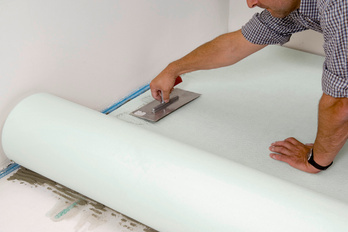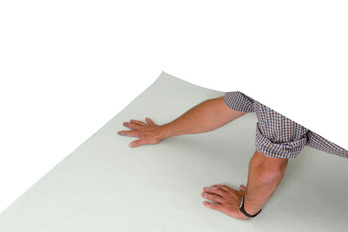Uncoupling membrane CERAfix® 205
Decoupling fleece CERAfix 205
DECOUPLING-FLEECE-(CERAFIX-205)-25M
Art.-no. 5875100205
EAN 4047376968257


Register now and access more than 125,000 products
Easy to apply
- Easy to unroll and lay
- Can be laid with no folds
- Minimal lengthwise and crosswise expansion
Suitable for new buildings and renovations
Application using CERAfix tile adhesives. Use ZAB4 notched trowel
Dispose of CERAfix 205 as construction waste.


Datasheets(X)
For isolating stresses when laying tiles, natural stone, ready-to-use parquet, solid parquet and laminate. On even as well as on critical substrates or substrates with adhesive residues and highly adhering screeds, such as those that regularly occur in renovations. Using CERAfix 205, hairline cracks and shrinkage cracks in mineral substrates up to a width of 0.5 mm can be bridged. The decoupling non-woven fabric's high degree of resistance to tearing reduces stresses from the substrate and keeps them away from the subsequent top substrate.
CERAfix® 205 is a laying surface with uniform absorbency, which means that shear tensions caused by uneven adhesive hardening can be prevented.
For system decoupling on thin-layered underfloor systems with CERAfix 222.
The surface must be dry, suitable for adhesion and level. Old coverings must ensure sufficient adhesion to the surface, which is why old loose textile or elastic coverings must be glued in place. Loose ceramic old coverings must be removed and compensated. In general, old parquet must be sanded. Prime absorbent and slightly sandy cement, gypsum, concrete, plastered, gypsum plasterboard, masonry surfaces etc. with CERAfix 101, CERAfix 102 or CERAfix 103. The fleece strips are initially positioned so they are loose and cut with a rough outline. For bonding, apply an even layer of CERAfix 403 LFX; insert strips and roller thoroughly.
Material | PES - Polyester |
Colour | Greenish |
Overall thickness | 0.8 mm |
Length of roll | 25 m |
Roll width | 1 m |
Coating weight per m² | 0.16 kg |




















